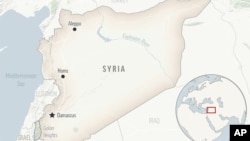Eight U.S. service members in Syria were injured in a drone attack by Iranian-backed militants last week, Pentagon press secretary Major General Pat Ryder said on Tuesday.
Tuesday marked the first time that the Pentagon blamed Iranian proxies for Friday's attack.
"We assess that it was conducted by Iranian-backed militia, but we're still digging into the specifics," Ryder said in response to a question from VOA at a Pentagon briefing.
Ryder told reporters the service members had been treated for smoke inhalation and traumatic brain injury. Three of the injured troops have returned to duty, he added.
Earlier, the U.S. military said several American and coalition personnel had been wounded in a drone attack late Friday at Rumalyn Landing Zone in eastern Syria but stressed that "none of the injuries are life threatening."
The United States has about 900 troops in Syria and 2,500 in neighboring Iraq to advise and assist local forces working to prevent a resurgence of the Islamic State terror group in the region.
The drone strike in Syria marked the second time this month that U.S. military personnel in the Middle East had been injured in attacks. Five Americans were injured in a rocket attack against al-Asad air base August 5 in Iraq, with three transported to Landstuhl Regional Medical Center in Germany for further care, according to deputy Pentagon press secretary Sabrina Singh.
Michael Singh, the managing director and Lane-Swig senior fellow at the Washington Institute of Near East Policy, told VOA that the United States should take a more proactive stance to prevent further "mayhem and violence" by Iran and Iranian-backed militants in the region.
"What the United States really needs to be doing is to get out of a mode of being simply reactive and really try to impose a cost on Iran especially, but also Iran's proxies for the actions they are taking," he said.
Iranian-backed militias have launched dozens of attacks against U.S. forces in the region since Israel began its military campaign in Gaza in response to Hamas' deadly October 7 terror attacks.




